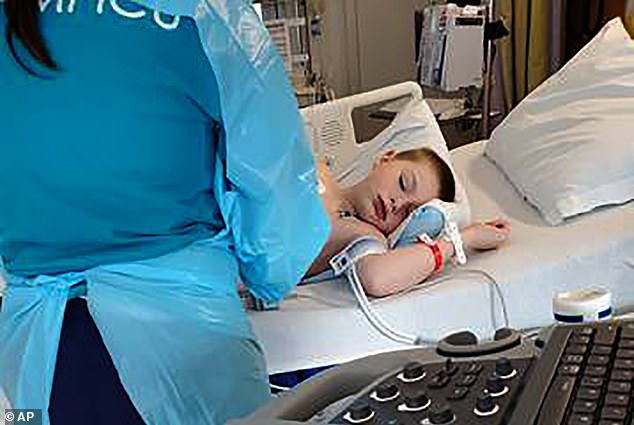Children with coronavirus who develop bizarre and dangerous inflammation similar to Kawasaki syndrome are suffering from an entirely new disease, a new study suggests.
At least 100 children in the US have developed a wide array of potentially life-threatening inflammatory symptoms after testing positive for coronavirus. Similar numbers have been seen in the UK and elsewhere in Europe.
Their symptoms most closely resembled Kawasaki syndrome, a rare disorder that strikes between nine and 20 per every 100,000 American children under age five per year.
Doctors have been scrambling to uncover the link between these symptoms and coronavirus but the latest effort, from Imperial College of London, suggests that what is happening to kids with COVID-19 is distinct from Kawasaki syndrome.
Specifically, they found that children with coronavirus tend to be older than those who develop Kawasaki syndrome, and more likely to develop heart and blood vessel problems that can be particularly life-threatening.
The results of the study also suggest that the new condition may not only be linked to coronavirus, but caused by it.
Bobby Dean, nine, was diagnosed with the rare inflammatory condition striking children who have had coronavirus. He spent six days in the hospital in Rochester, New York. New research suggests the disease is an entirely new one, and may be caused by COVID-19 (file)
‘The new condition, PIMS-TS, is extremely rare but it can make a child very ill, so it’s important to characterise the disease properly so we can provide close monitoring and the best treatment,’ said lead author Dr Elizabeth Whittaker, of Imperial College Healthcare NHS Trust.
‘For any parents worried about their children, I would urge them to follow their usual instincts – whatever would normally prompt you to visit your GP or A&E with your child still applies here.’
The Imperial College London group assessed 58 children who met the proposed criteria for childhood multisystem inflammatory disorders suggested by both UK health authorities and the World Health Organization.
Of the children with the multi-organ inflammation, 83 percent had coronavirus antibodies, meaning they’d already been infected.
That is consistent with the findings of a Mt Sinai study conducted in New York, which proposed that the Kawaski-like symptoms might be due to a pediatric version on the inflammatory ‘cytokine storm’ seen in adults – but it appeared to strike children later, often after they’d already cleared coronavirus infection.
In the new new study, researchers found signs of both general inflammation and heart problems in the children’s blood.
Inflammation is an important part of the immune system’s response to infection, occurring as germ-fighting cells flood the site of a pathogen’s invasion.
But in adult coronavirus patients, this response sometimes runs haywire, as the immune system tries and fails to dismantle the unfamiliar coronavirus.
At that point, the inflammation itself can start overwhelming and damaging healthy tissues, leading to severe illness and even death.
Most children who catch coronavirus develop only mild symptoms, or none at all.
But a small subset of kids infected have become dangerously ill with the inflammatory symptoms, prompting the US Centers for Disease Control and Prevention (CDC), National Health Service (NHS) in the UK and the WHO to issue warnings.
Both Kawasaki syndrome and the apparently new condition first present with a sustained fever lasting several days.
Covid-positive children, however, tended to also have abdominal pain and diarrhea, symptoms not usually present in Kawaski.
The dangerous inflammation was also much more common in children who were black or of Asian descent.
Kawaski is known to cause damage to blood vessels, restricting their growth and reducing blood flow to the heart.
This was apparent in children with the new condition – currently being called Paediatric Inflammatory Multisystem Syndrome Temporally associated with SARS-CoV-2, or PIMS-TS – may be even more prone to heart problems, shock and organ failure.
Immune therapy has been shown to help kids with Kawasaki beat inflammation more quickly, and is being tried in children with PIMS-TS, however the researchers note that the two conditions are different enough that they’re carefully monitoring treatment in the latter.
It’s still to soon to say for certain that PIMS-TS is caused by COVID-19.
But with 45 out of 58 of the children in the study testing positive for coronavirus antibodies, the researchers say it’s unlikely that the appearance of the new condition in the midst of a pandemic is a coincidence.
